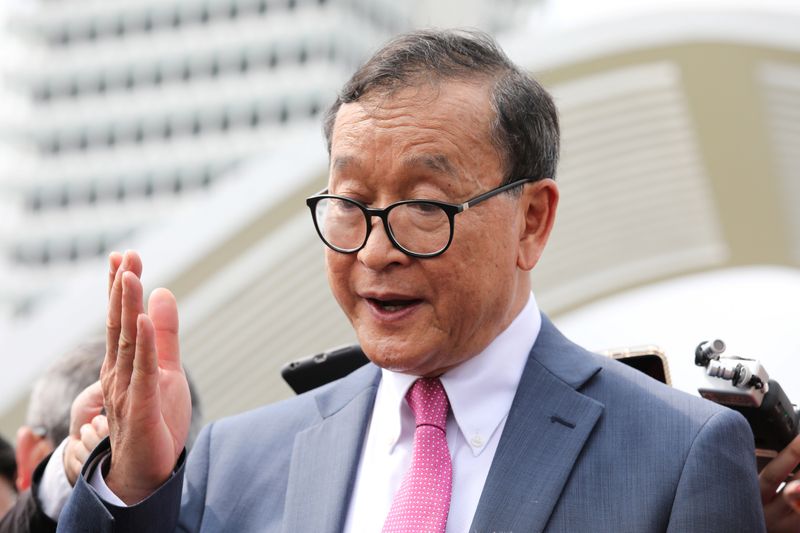By Prak Chan Thul
PHNOM PENH (Reuters) – Speaking from the back of a pickup truck decked out with campaign posters and loudspeakers, veteran politician Son Chhay is determined to convince voters that democracy in Cambodia is not dead.
With the newly created Candlelight Party, he and other activists are contesting upcoming local elections, hoping to resurrect political opposition to what has become a one-party state under Prime Minister Hun Sen.
The ruling Cambodian People’s Party (CPP) has in recent years moved to crush all dissent by jailing more than 100 opposition members for treason, prompting international criticism of Hun Sen, who has ruled for 37 years.
“A victory for the Candlelight Party is a victory for all Cambodians,” Son Chhay, the party’s vice president, told cheering crowds gathered recently on the outskirts of the capital, Phnom Penh, as campaigning got under way for the nationwide commune elections on June 5.
But the CPP, which controls the vast majority of 1,652 communes, maintains a vice-like grip on the political landscape that analysts say the fledgling opposition party is unlikely to loosen given the intimidation and legal and bureaucratic battles it faces.
Sok Eysan, a spokesperson for the ruling CPP, dismissed as insubstantial any contest posed by the sole opposition camp, dismissing it as a “piece of broken glass”.
REBRANDED
The Candlelight Party, though only six months old, is not exactly new.
Its leadership is populated with former members of the Cambodia National Rescue Party (CNRP), an opposition party that the Supreme Court disbanded in 2017 as part of a wider crackdown on Hun Sen’s critics.
The ban came just after the CNRP had won 40% of communes in the last local elections, and all of its areas were handed over to the ruling CPP, giving it near total control.
CNRP co-founder, Sam Rainsy, a former finance minister in exile in France, helped rebrand the opposition as the Candlelight Party with Son Chhay, who serves as its vice president.
The party has attracted young and low-income voters by promising universal healthcare, equal access to education and a crackdown on drugs and crime.
“The Candlelight Party won’t allow any development that causes people’s tears. We won’t allow anyone to rob people of their land,” Son Chhay told supporters at the rally outside Phnom Penh, speaking to a concern many Cambodians share about forced evictions at the hands of real estate, mining or agricultural corporations.
The party’s total membership is not clear but it is fielding candidates in 90% of the 1,652 communes and “hoping to win many”, said secretary general Lee Sothearayuth.
Inheriting the old party infrastructure and supporters makes it the only opposition party that poses a realistic threat to the CPP, said Sebastian Strangio, journalist and author of the book “Hun Sen’s Cambodia”.
“Whether it will succeed in doing so this year, however, is unlikely. For the CPP, political survival comes first, and the moment that the Candlelight Party poses a serious threat to Hun Sen’s camp will be the moment that this party, too, finds itself banned or pressured into submission,” he said.
‘INTIMIDATION’
Already the Candlelight Party has felt the heat. The Ministry of Interior has said Son Chhay’s appointment as a party deputy is illegal and at least 24 complaints have been filed accusing the party of faking candidates’ documents.
Son Chhay says the accusations are politically motivated and that in fact, Candlelight candidates have faced bureaucratic hurdles in even registering for the election.
“We see this as intimidation, they like to use the courts to intimidate us,” he said.
The CPP called that complaint “baseless” and defended its practice of handing out cash and gifts to voters ahead of elections.
“If they are true, competing political parties can file complaints to the National Election Commission. However, there have been no complaints,” said CPP spokesperson Sok Eysan.
Further undercutting Candlelight’s efforts is disagreement within the opposition over tactics. Once-friendly politicians like the influential former CNRP chief, Kem Sokha, say the new party should not be participating in what some consider a compromised election.
“The Candlelight Party plays right into Hun Sen’s hands,” said Kem Sokha’s daughter, Kem Monovithya.
Many see the commune elections as a bellwether for a general election next year and the ruling party is expected to win most communes next week.
Despite the obstacles, the Candlelight Party is aiming at the very least to get opposition candidates back into the public eye, hoping that any support now can translate to national-level success next year.
“Because people have lost their representation for nearly five years, they have difficulties, they have been suffering. So this is the chance they have to come out and find their representatives.”
(Writing by Kanupriya Kapoor; Editing by Robert Birsel)



